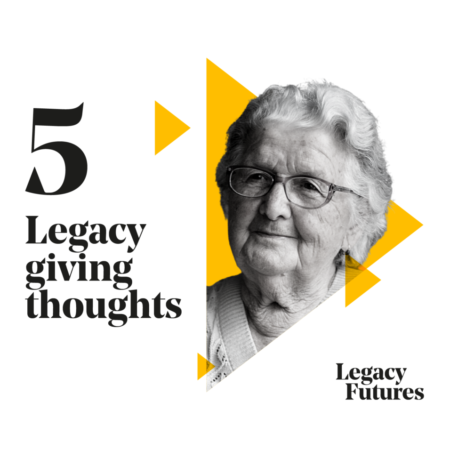For Small Charity Week, we’ve put together five thoughts from across the Legacy Futures group for those charities thinking about their Gifts in Wills and In Memory giving.
1. Be prepared for lots of volatility in income
Jon Franklin, Economist, Legacy Foresight
Legacy income for any charity is notoriously uncertain – it can be significantly affected by a handful of large gifts – but for small charities that receive a smaller number of bequests, this volatility can be even more extreme. This means it’s important to look at income over, say, five years rather than one year and plan accordingly – don’t get carried away with a couple of good years or despair over a couple of bad years.
It also means that looking at trends in the number of bequests rather than the income of those bequests provides a better indication of the underlying legacy health of a small charity.
2. Get set up to be able to process gifts
Maria King, Legacy Link
It’s easy to fall into having to do legacy administration casework – a generous gift in a Will from a deceased supporter can be the first time a small charity has to think about legacies and what to do with them. It’s always worth making sure you are properly set up from the outset, with the right legal and technical expertise on hand, clearly defined processes and procedures, and clarity over decision making and levels of authority from the Trustees down.
As your legacy cases and income grow, your legacy administration casework and resourcing needs will too. It can be challenging for a growing team if there is no consistent or documented way of dealing with things. Organisational risks, be they financial or reputational, may also not be managed appropriately without considering of all the issues. Thinking of what insight (and when) your finance team and external auditors may also need whilst setting up your initial systems can support casework, forecasting and reporting working as well together as possible.
3. Use your size to your advantage
Kate Jenkinson, Head of In Memory Consultancy, Legacy Foresight
We know how crucial personalised stewardship is to Gifts in Wills and In Memory donors, and this poses a challenge for big charities as it is often hard to scale truly personalised contact. As a smaller charity, you have the opportunity to build much more direct relationships with these supporters.
Also, something that often comes up from smaller charities in our workshops is that they like to hear what bigger charities are doing and then work out ways to implement it into their charities at their scale. They often don’t have the restrictions of bureaucracy or lots of big teams to co-ordinate with, so they can test out and try new ideas quickly and adapt what works and what doesn’t.
4. Look at what you already do
Dr Claire Routley, Head of Gifts in Wills Consultancy, Legacy Voice
The classic approach to legacy fundraising is the drip-drip approach – mentioning Gifts in Wills little and often through the various channels available to you. There are several benefits to this approach: if you mention Gifts in Wills regularly, people are more likely to see messages at a time that’s appropriate to them; it can help normalise the idea of giving in this way, rather than being something slightly odd that only the mega-rich or eccentric people do; You can gently communicate the message; for example, a story about a new service your charity offers might mention that a gift in a will funded it.
You can implement the drip-drip approach by thinking about what you do already and considering how you can include legacy within each element, from stories in your newsletter to tick boxes on forms to social media posts. It can be great for small charities as it doesn’t take a huge amount of time or financial resource as you’re making the most of your existing channels.
5. Make the most of the free or cheap resources out there
Ashley Rowthorn, CEO, Legacy Futures
Legacy fundraisers seem to be particularly willing to share expertise with others – via the CIOF’s Legacy and In Memory special interest group and the Institute of Legacy Management. There’s lots of info available from Remember a Charity and Smee and Ford. And, of course, there are great resources and insight that Legacy Foresight makes available, alongside Legacy Voice’s literature review.
We hope you’ve found these tips helpful, for more like this sign up to our newsletter in the footer.
Wherever you are on your legacy journey, Legacy Futures can help. Get in touch if you’d like to discuss anything legacy giving with our team.

